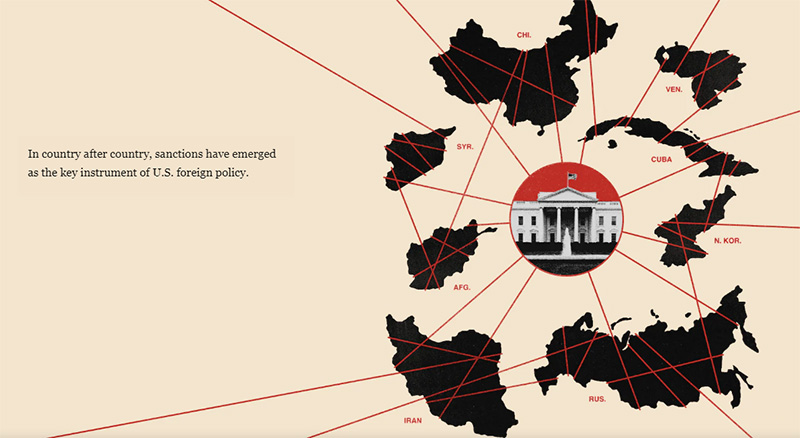
Today, the United States imposes three times as many sanctions as any other country or international body, targeting a third of all nations with some kind of financial penalty on people, properties or organizations. They have become an almost reflexive weapon in perpetual economic warfare, and their overuse is recognized at the highest levels of government. But American presidents find the tool increasingly irresistible, writes ‘The Washington Post’.
By cutting their targets off from the Western financial system, sanctions can crush national industries, erase personal fortunes and upset the balance of political power in troublesome regimes — all without putting a single American soldier in harm’s way.
But even as sanctions have proliferated, concern about their impact has grown.
In Washington, the swell of sanctions has spawned a multibillion-dollar industry. Foreign governments and multinational corporations spend exorbitant sums to influence the system, while white-shoe law firms and K Street lobbying shops have built booming sanctions practices — in part by luring government officials to cash in on their expertise.
Sanctions — or even just the threat of them — can be an effective policy tool, a way to punish bad behavior or pressure an adversary without resorting to military force. Even when they fail, proponents say, they can be preferable to the alternative, which might be doing nothing — or going to war.
Still, North Korea has been sanctioned for more than a half-century without halting Pyongyang’s efforts to acquire nuclear weapons and intercontinental ballistic missiles. U.S. sanctions on Nicaragua have done little to deter the authoritarian regime of President Daniel Ortega.
Two years of sanctions on Russia over its invasion of Ukraine have degraded Moscow’s long-term economic prospects and raised the costs of military production. But these sanctions have also spawned a “dark fleet” of ships selling oil outside international regulations, while bringing the Kremlin into closer alliance with Beijing.
Alarm about sanctions’ rise has reached the highest levels of the U.S. government: Some senior administration officials have told President Biden directly that overuse of sanctions risks making the tool less valuable.
The United States is imposing sanctions at a record-setting pace again this year, with more than 60 percent of all low-income countries now under some form of financial penalty, according to a Washington Post analysis.
“It is the only thing between diplomacy and war and as such has become the most important foreign policy tool in the U.S. arsenal,” said Bill Reinsch, a former Commerce Department official and now the Scholl chair in international business at the Center for Strategic and International Studies, a Washington-based think tank.
“And yet,” Reinsch said, “nobody in government is sure this whole strategy is even working.”
The U.S. government is putting more sanctions on foreign governments, companies and people than ever. But these powerful tools of economic warfare can have unintended consequences, hurting civilian populations and undermining U.S. foreign policy interests. The Money War investigates the proliferation of U.S. financial sanctions and the dangers of overuse.
A more existential challenge emerged, as well: The power of sanctions lay in denying foreign actors access to the dollar. But if sanctions make it risky to depend on dollars, nations may find other ways to trade — allowing them to dodge U.S. penalties entirely.
In March 2016, Obama Treasury Secretary Jack Lew warned publicly of “sanctions overreach” and the risk that their “overuse could ultimately reduce our capability to use sanctions effectively.”
“The mentality, almost a weird reflex, in Washington has just become: If something bad happens, anywhere in the world, the U.S. is going to sanction some people. And that doesn’t make sense,” said Ben Rhodes, who served as deputy national security adviser in the Obama administration.
read more in our Telegram-channel https://t.me/The_International_Affairs

 12:44 30.07.2024 •
12:44 30.07.2024 •






















